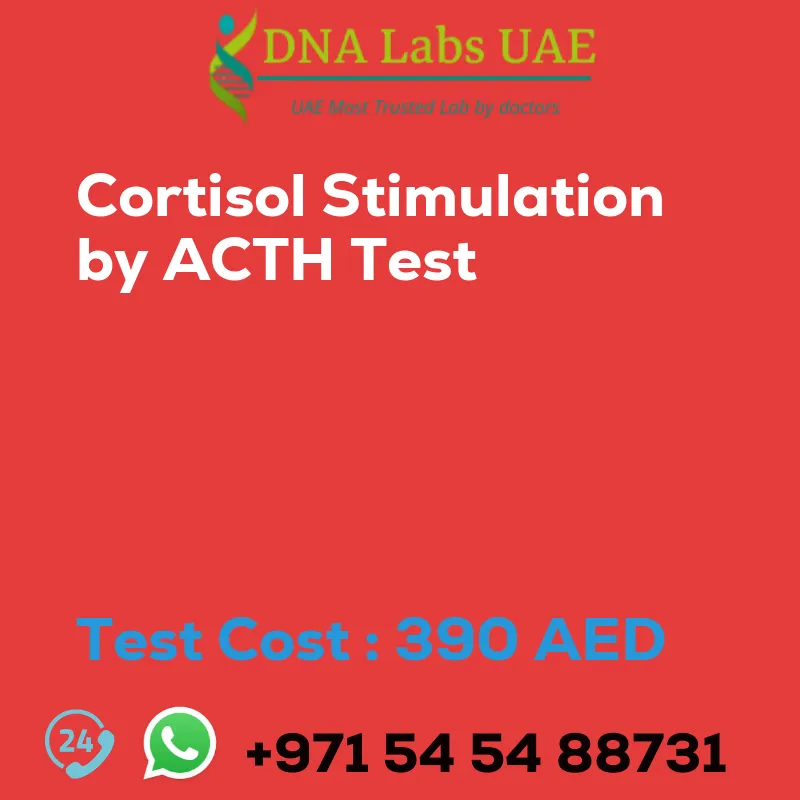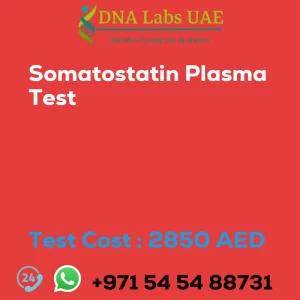Cortisol Stimulation by ACTH Test Price 390 AED In Dubai
Comprehending the ACTH-Induced Cortisol Stimulation Test in the UAE
The human body is an intricate system, and preserving hormonal equilibrium is crucial for peak health. Cortisol, a hormone synthesized by the adrenal glands, is instrumental in managing stress response, metabolism, and blood glucose levels. If you’re exhibiting symptoms indicative of adrenal insufficiency in the UAE, the ACTH-Induced Cortisol Stimulation Test can be a significant resource for your doctor to identify the root cause.
Cortisol and the Adrenal Glands’ Function
The adrenal glands, situated atop your kidneys, generate several hormones, including cortisol. Cortisol assists your body in dealing with stress, controlling blood glucose levels, and supporting essential functions like metabolism and immune response.
What Constitutes Adrenal Insufficiency?
Adrenal insufficiency transpires when the adrenal glands fail to produce adequate cortisol. This can be triggered by various elements, such as autoimmune disorders, medication usage, or previous surgery involving the adrenal glands.
Decoding the ACTH-Induced Cortisol Stimulation Test
This diagnostic examination assesses your adrenal glands’ capacity to generate cortisol in response to stimulation. Here’s an outline of the process:
- Initial Blood Draw: A healthcare professional will initially draw a blood sample to gauge your resting cortisol level.
- ACTH Injection: ACTH (Adrenocorticotropic Hormone) is a hormone that naturally prompts the adrenal glands to synthesize cortisol. A synthetic variant of ACTH is then injected.
- Post-Stimulation Blood Draw(s): One or more blood samples are drawn at specific intervals (typically 30, 60, or 90 minutes) post the ACTH injection to measure your cortisol levels again.
How Does the Test Assist in Diagnosing Adrenal Insufficiency?
By contrasting your baseline cortisol level with the levels gauged post ACTH stimulation, the doctor can evaluate your adrenal function:
- Normal Results: A substantial rise in cortisol levels post ACTH injection indicates your adrenal glands are functioning properly and responding to stimulation.
- Abnormal Results: A minimal or no increase in cortisol levels post ACTH stimulation suggests insufficient cortisol production, potentially indicating adrenal insufficiency.
Advantages of the ACTH-Induced Cortisol Stimulation Test:
- Precise Diagnosis: Offers valuable insights into your adrenal function, aiding in the diagnosis of adrenal insufficiency and distinguishing it from other conditions.
- Treatment Monitoring: Can be employed to monitor the efficacy of cortisol replacement therapy in managing adrenal insufficiency.
- Early Detection: May assist in identifying potential future complications associated with untreated adrenal insufficiency.
Who Stands to Gain from the ACTH-Induced Cortisol Stimulation Test?
This test might be suggested by your doctor in the UAE if you exhibit:
- Symptoms indicative of adrenal insufficiency, such as fatigue, weakness, muscle aches, weight loss, loss of appetite, and darkened skin (hyperpigmentation).
- A known risk factor for adrenal insufficiency, such as autoimmune diseases, prior surgery involving the adrenal glands, or prolonged use of certain medications.
- Unexplained low blood sodium levels.
What to Anticipate During the Test?
The ACTH-Induced Cortisol Stimulation Test is an outpatient procedure. You may experience minor discomfort from the blood draws and the ACTH injection. It’s crucial to adhere to any specific instructions provided by your doctor regarding fasting or medication intake prior to the test.
Managing Your Adrenal Health Effectively
If you’re apprehensive about adrenal insufficiency or suspect you might have low cortisol levels, discussing the ACTH-Induced Cortisol Stimulation Test with your doctor in the UAE can be a vital step towards diagnosis and proper management. Early detection and treatment of adrenal insufficiency can significantly enhance your quality of life.
Test Dtails
The cortisol stimulation test, also known as the ACTH stimulation test, is a medical procedure used to evaluate the function of the adrenal glands. It is primarily used to diagnose conditions such as adrenal insufficiency or Cushing’s syndrome.
During the test, a synthetic form of adrenocorticotropic hormone (ACTH) is injected into the patient’s bloodstream. ACTH is normally produced by the pituitary gland and stimulates the adrenal glands to produce cortisol. By administering synthetic ACTH, the doctor can assess the ability of the adrenal glands to respond to this hormone.
Blood samples are taken before and after the ACTH injection to measure cortisol levels. Typically, the baseline cortisol level is measured, and then additional samples are taken at 30 minutes and 60 minutes after the injection. In a normal response, the adrenal glands will produce an increased amount of cortisol in response to the ACTH stimulation. However, in individuals with adrenal insufficiency, the adrenal glands may not be able to produce enough cortisol, resulting in lower cortisol levels after the stimulation. On the other hand, in individuals with Cushing’s syndrome, the adrenal glands may produce excessive cortisol, leading to higher cortisol levels after the stimulation.
Test Name: CORTISOL STIMULATION BY ACTH Test
Components: 2 mL (0.5 mL min.) serum from 1 SST for each timed specimen. Draw fasting baseline sample; administer 250 ug of synthetic ACTH (Synacthen) IV, draw additional samples at 30 and 60 min. Ship refrigerated or frozen. All tubes must be clearly marked with time drawn. Submit all tubes with one test request form.
Report Delivery: Daily
Method: Chemiluminescent Immunoassay
Test type: Disorders of Adrenal Gland
Doctor: Endocrinologist
Test Department:
Pre Test Information: Overnight fasting is mandatory. Synthetic ACTH (Synacthen) is not supplied by LPL.
| Test Name | CORTISOL STIMULATION BY ACTH Test |
|---|---|
| Components | |
| Price | 390.0 AED |
| Sample Condition | 2 mL (0.5 mL min.) serum from 1 SST for each timed specimen . Draw fasting baseline sample; administer 250 ug of synthetic ACTH (Synacthen) IV, draw additional samples at 30 and 60 min. Ship refrigerated or frozen. All tubes must be clearly marked with time drawn. Submit all tubes with one test request form. |
| Report Delivery | Daily |
| Method | Chemiluminescent Immunoassay |
| Test type | Disorders of Adrenal Gland |
| Doctor | Endocrinologist |
| Test Department: | |
| Pre Test Information | Overnight fasting is mandatory. Synthetic ACTH (Synacthen) is not supplied by LPL. |
| Test Details | The cortisol stimulation test, also known as the ACTH stimulation test, is a medical procedure used to evaluate the function of the adrenal glands. It is primarily used to diagnose conditions such as adrenal insufficiency or Cushing’s syndrome.During the test, a synthetic form of adrenocorticotropic hormone (ACTH) is injected into the patient’s bloodstream. ACTH is normally produced by the pituitary gland and stimulates the adrenal glands to produce cortisol. By administering synthetic ACTH, the doctor can assess the ability of the adrenal glands to respond to this hormone.
Blood samples are taken before and after the ACTH injection to measure cortisol levels. Typically, the baseline cortisol level is measured, and then additional samples are taken at 30 minutes and 60 minutes after the injection. In a normal response, the adrenal glands will produce an increased amount of cortisol in response to the ACTH stimulation. However, in individuals with adrenal insufficiency, the adrenal glands may not be able to produce enough cortisol, resulting in lower cortisol levels after the stimulation. On the other hand, in individuals with Cushing’s syndrome, the adrenal glands may produce excessive cortisol, leading to higher cortisol levels after the stimulation. The cortisol stimulation test is a safe procedure, but it may have some side effects such as flushing, nausea, or a temporary increase in blood pressure. It is important to discuss any potential risks or concerns with your healthcare provider before undergoing the test. Overall, the cortisol stimulation test is a valuable tool in diagnosing adrenal gland disorders and assessing adrenal function. It helps healthcare providers determine the underlying cause of symptoms and develop an appropriate treatment plan. |








